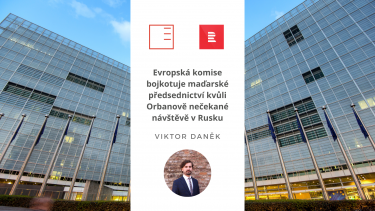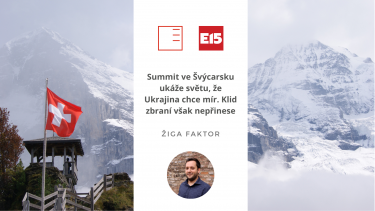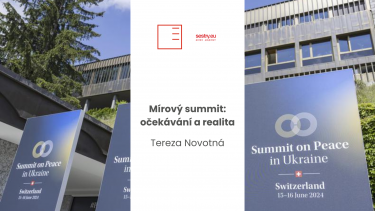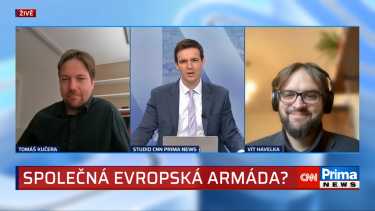ČRo | The European Commission boycotts the Hungarian presidency due to Orban's unexpected visit to Russia
The European Commission has announced that, in light of developments since the beginning of the Hungarian presidency of the Council of the European Union, it plans to boycott informal ministerial meetings and send only senior officials instead of commissioners. Viktor Orbán has come under criticism for his recent trip to Russia, which he described as a peace mission aimed at ending the war in Ukraine and which he did not consult with the leaders of other EU states. This move comments Viktor Daněk, deputy director of EUROPEUM Institute for Czech Radio.
Show moree15 | Summit in Switzerland will show the world that Ukraine wants peace. But it will not bring it
The luxury Alpine hotel Bürgenstock on the shores of Lake Lucerne in Switzerland will host the largest peace conference on Ukraine to date this coming weekend. Leaders and diplomats from nearly 90 countries will be there to seek ways to end the worst armed conflict in Europe since the Second World War. The ambitious event has been accompanied by criticism over the non-participation of Russia, China and US President Joe Biden. Even so, experts say the summit could be an important first step towards peace. Žiga Faktor, deputy director and head of the Brussels office of EUROPEUM Institute, describes the possibilities the conference will offer for e15 journal.
Show more
Sestry.eu | Peace summit in Switzerland: expectations and reality
Ninety countries and organizations confirmed their participation in the Peace Summit focusing on the war against Ukraine in Switzerland. The United States will be represented by Vice President Kamala Harris, China refused to participate and Russia was not invited. What are the key goals of the summit? Why did China decide not to come? Researcher at EUROPEUM Institute Tereza Novotná commented for Ukrainian-Polish online outlet Sestry.eu.
Show more
CNN Prima News | The European Army and the position of the Defense Commissioner
The next European Commission should have a new Commissioner for Defense. There is speculation that this position could go to the Czech Republic. However, some European politicians, such as French President Emmanuel Macron, are calling directly for the creation of European army. But what are the pitfalls of the project? Vít Havelka, a research fellow at EUROPEUM Institute, talked about the usefulness and possibilities for CNN Prima News.
Show more
ČRo Radiožurnál | Use of Russian assets under the European Peace Facility
The European Commission has proposed how to make use of frozen Russian assets in Europe after the start of the Russian invasion of Ukraine. Up to ninety percent of the assets would be used to buy weapons for Ukraine under the so-called European Peace Facility. The remaining 10% would be transferred to the EU budget and used for the recovery and reconstruction of Ukraine. The proposal still needs to be unanimously approved by EU foreign ministers. Martin Vokálek, Executive Director of EUROPEUM Institute, commented on what this proposal will mean for Ukraine and the European Union for Czech Radio Radiožurnál.
Show more
RTVS | The European Union approves aid to Ukraine of 5 billion euros and creates a special fund
The countries of the European Union have approved aid in the form of an increase of the European Peace Facility (EPF) by five billion euros. The decision to create a special fund to help Ukraine represents an important step towards strengthening support for the country against Russian aggression. Žiga Faktor, deputy director of the EUROPEUM Institute and head of the Brussels office, commented on the creation of the fund and its possible results for Slovakian RTVS.
Show more
EU-Pacific Talks | Unveiling Global South Dynamics: EU and Indo-Pacific Perspectives
We would like to invite you to another debate of the EU-Pacific Talks series, this time on the topic "Unveiling Global South Dynamics: EU and Indo-Pacific Perspectives". The debate will take place on Friday, 9 February at 11:00 a.m. via an online stream on FB.
Show more

EU-Pacific Talks | Charting the course for Ukraine: Reassessment of the Indo-Pacific
We would like to invite you to the next debate in the EU-Pacific Talks series, this time on the topic "Charting the course for Ukraine: Reassessment of the Indo-Pacific". The online debate will take place on Tuesday, 28 November, from 13:00 to 14:00 as an online stream on FB.
Show more
EU-Pacific Talks: Taiwan and security dimension – lessons learned, Indo-Pacific containment
We would like to invite you to an online debate titled "Taiwan and security dimension - lessons learned, Indo-Pacific containment" as part of the EU-PACIFIC Talks series. Expand your knowledge of Taiwan's security situation and come to the debate, which will take place on our Facebook page on Friday, 6 October at 14:00.
Show more
POLICY PAPER | Gendering Europe’s Security and Recovery Responses to Ukraine
The policy paper, written by Míla O’Sullivan, illustrates that to centre the gender dimension and women’s voices in all aspects of Europe’s security and recovery responses to Ukraine are areas with the most serious gendered impacts and identifies the risks of gender-oblivious responses to Ukraine’s peaceful and sustainable future as well as to its European integration.
Show moreStaroměstské náměstí 4/1
Prague 1 - Staré Město
110 00
tel.: +420 212 246 552
email: europeum@europeum.org
https://www.europeum.org









